April is National Poetry Month, and it’s a great time to introduce students of all ages to a variety of poets and poems. This month’s selection of titles contains pieces from traditional and well-known poets as well as new voices, all of which can be an ideal introduction to poetry for your students.
Won Ton and Chopstick by Lee Wardlaw
Grades K-3
This sequel to Wardlaw’s 2011 picture book Won Ton finds the former shelter cat comfortably ensconced in his new home with his Boy. Days have fallen into a comfortable routine of nap, play, bathe, eat, repeat. Won Ton soon gets a sneaking suspicion that all is not well in his world: new and unfamiliar toys dot the floor, and a previously open door is constantly closed. His worst fears are realized when, with “eyes full of Doom,” he finds out his family has adopted another pet–a dog! Although there are growing pains–the newly christened Chop Stick eats Won Ton’s food, Won Ton encourages Chop Stick to dig in Mom’s tulip garden–the pair soon bond. Left home alone one rainy day, they happily dig through the trash together and discover a mutual love of playing with balls. Like the original Won Ton, this sequel tells its story through a series of haikus. Wardlaw uses the traditional five-seven-five structure to create dynamic text that pairs well with Eugene Yelchin’s engaging and fun illustrations. This book is the perfect way to introduce haiku to young readers, and even get them started in creating their own.
of nap, play, bathe, eat, repeat. Won Ton soon gets a sneaking suspicion that all is not well in his world: new and unfamiliar toys dot the floor, and a previously open door is constantly closed. His worst fears are realized when, with “eyes full of Doom,” he finds out his family has adopted another pet–a dog! Although there are growing pains–the newly christened Chop Stick eats Won Ton’s food, Won Ton encourages Chop Stick to dig in Mom’s tulip garden–the pair soon bond. Left home alone one rainy day, they happily dig through the trash together and discover a mutual love of playing with balls. Like the original Won Ton, this sequel tells its story through a series of haikus. Wardlaw uses the traditional five-seven-five structure to create dynamic text that pairs well with Eugene Yelchin’s engaging and fun illustrations. This book is the perfect way to introduce haiku to young readers, and even get them started in creating their own.
A Moose Boosh: A Few Choice Words about Food by Eric-Shabazz Larkin
Grades 4-8
This new poetry collection from artist Larkin features his signature style of “vandalized” photographs paired with funny poems inspired by food. The title of the work is a play on the concept of an “amuse bouche,” defined in  the first pages as a tiny bite served before the meal as well as “an appetizing little poem about food to be read aloud just before dinner or any time at all.” The cheeky tone of the book is first on display in the table of contents which is designed like a menu, with poems organized into starters, specials and sides. The poems range from funny to thought-provoking: “Hungry” laments the troubles of eating with braces, and “Bare Cupboards” shares the fear of empty pantries and refrigerators. Larkin says a lot with his spare text: there are poems that discuss food deserts, unpronounceable ingredients and where food is sourced. All of these are great starting points for rich classroom discussion. But not every poem is so serious—there’s also a lot of humor. One poem talks about taking a pet cabbage for a walk, and one lists all the things the author would rather do than eat more beets (they include licking cats and kissing dogs!). This book can be paired with Farmer Will Allen and the Growing Table, a biography of the former basketball star and pioneer of the urban farming movement, which is also illustrated by Larkin.
the first pages as a tiny bite served before the meal as well as “an appetizing little poem about food to be read aloud just before dinner or any time at all.” The cheeky tone of the book is first on display in the table of contents which is designed like a menu, with poems organized into starters, specials and sides. The poems range from funny to thought-provoking: “Hungry” laments the troubles of eating with braces, and “Bare Cupboards” shares the fear of empty pantries and refrigerators. Larkin says a lot with his spare text: there are poems that discuss food deserts, unpronounceable ingredients and where food is sourced. All of these are great starting points for rich classroom discussion. But not every poem is so serious—there’s also a lot of humor. One poem talks about taking a pet cabbage for a walk, and one lists all the things the author would rather do than eat more beets (they include licking cats and kissing dogs!). This book can be paired with Farmer Will Allen and the Growing Table, a biography of the former basketball star and pioneer of the urban farming movement, which is also illustrated by Larkin.
Red Butterfly by A. L. Sonnichsen
Grades 3-7, Lexile 830
Kara was born with a physical deformity that left her with just one hand. Shortly after birth, she was abandoned on the streets of China. She was found and taken in by an older American woman whose visa soon expired, and Kara, now 11 years old, doesn’t have official identification or paperwork. Her mother hopes to wait un til Kara is 18 so she can legally return to the United States. Due to her mother’s illegal status, the two infrequently go out in public together, and Kara can’t be enrolled in school and knows little Chinese. Kara and her adoptive mother live in poverty, waiting for the money that Daddy infrequently sends from his home in Montana. Kara finds pleasure in racing around her neighborhood in her old red bicycle, the red butterfly of the title. However, a series of events leads to the deportation of Kara’s mother, and Kara is sent to an orphanage for disabled children. There she learns to make friends and is soon adopted by an American couple. While Kara is torn between loyalty and love for the woman who raised her (who was deemed too old to file for a legal adoption), she also yearns for a so-called normal life and eventually finds a place with her new family in Florida. This novel-in-verse is told in a series of small vignettes which are divided into three sections: Crawl, which tells the story of Kara in Tianjin with her elderly mother; Dissolve, which finds Kara in the orphanage, and Fly, set in Florida. The author includes back matter detailing her own time spent working in China’s orphanages, and her efforts to adopt a Chinese child. Although some of the novel may be too sad for younger audiences, the ending is uplifting, with Kara settling into her new home with a supportive family and learning to accept her disability.
til Kara is 18 so she can legally return to the United States. Due to her mother’s illegal status, the two infrequently go out in public together, and Kara can’t be enrolled in school and knows little Chinese. Kara and her adoptive mother live in poverty, waiting for the money that Daddy infrequently sends from his home in Montana. Kara finds pleasure in racing around her neighborhood in her old red bicycle, the red butterfly of the title. However, a series of events leads to the deportation of Kara’s mother, and Kara is sent to an orphanage for disabled children. There she learns to make friends and is soon adopted by an American couple. While Kara is torn between loyalty and love for the woman who raised her (who was deemed too old to file for a legal adoption), she also yearns for a so-called normal life and eventually finds a place with her new family in Florida. This novel-in-verse is told in a series of small vignettes which are divided into three sections: Crawl, which tells the story of Kara in Tianjin with her elderly mother; Dissolve, which finds Kara in the orphanage, and Fly, set in Florida. The author includes back matter detailing her own time spent working in China’s orphanages, and her efforts to adopt a Chinese child. Although some of the novel may be too sad for younger audiences, the ending is uplifting, with Kara settling into her new home with a supportive family and learning to accept her disability.
The Death of the Hat: A Brief History of Poetry in 50 Objects by Paul B. Janeszko ![]()
Grades 3-7
Award-winning poet Janeszko is back with another poetry anthology illustrated by Chris Raschka. In his newest title, Janeszko takes the reader on a poetic tour of history, with poems presented chronologically through time. Beginning in the Middle Ages, Janeszko presents a diverse collection of poems, each centered around an object, either natural or man-made. There are lots of familiar names here–including Shakespeare, Longfellow, Poe and others–as well as selections from lesser known poets like Rumi, Kim Ku and Billy Collins (author of the titular “The Death of the Hat”). Janeszko’s selections not only offer a good introduction to students interested in exploring poetry, but the separation of poems into their different time periods provides historical context ideal for cross-curricular lessons. These poems can also be used to inspire students to create their own compositions around found objects.
poems presented chronologically through time. Beginning in the Middle Ages, Janeszko presents a diverse collection of poems, each centered around an object, either natural or man-made. There are lots of familiar names here–including Shakespeare, Longfellow, Poe and others–as well as selections from lesser known poets like Rumi, Kim Ku and Billy Collins (author of the titular “The Death of the Hat”). Janeszko’s selections not only offer a good introduction to students interested in exploring poetry, but the separation of poems into their different time periods provides historical context ideal for cross-curricular lessons. These poems can also be used to inspire students to create their own compositions around found objects.
Out and About: A First Book of Poems by Shirley Hughes
Shirley Hughes is a beloved children’s author/illustrator and was awarded the Order of the British Empire (OBE) for her work. This new collection of poems for children follows exuberant Katie and her younger brother Olly as they greet each day with enthusiasm, no matter the weather or circumstances. This book works well as a mentor text for young readers who can follow Katie’s and Olly’s adventures through the seasons, utilizing background knowledge to make text-to-self and text-to-world connections around the poems and pictures. This title can also be used as a read-aloud; the simple poems offer plenty of opportunity to share the siblings’ experiences with mud puddles in spring, the community pool in summer, and even getting sick in winter.


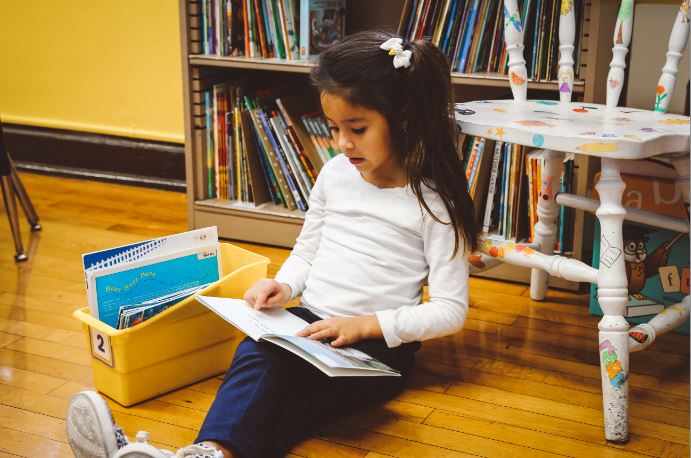

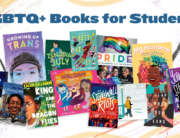
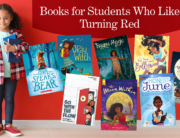
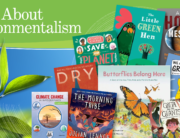
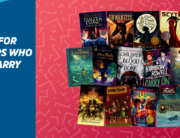
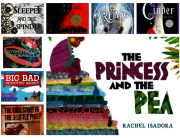
Me-wow! Thank you so much for featuring WON TON AND CHOPSTICK as one of your Poetry Month titles! If anyone is interested, there is a curriculum guide (with connections to the Common Core) and a fun activity kit for WON TON AND CHOPSTICK on my website at: http://www.leewardlaw.com/Won-Ton-Chopstick.htm
Purrs and woofs,
Lee Wardlaw